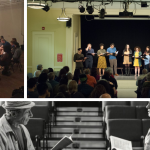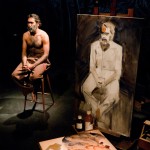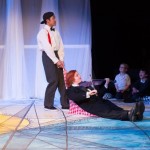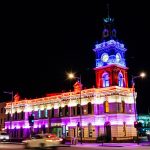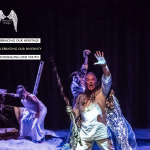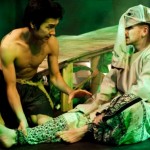Genre: Drama
Venue: Blue Elephant Theatre, 59a Bethwin Rd, Camberwell, SE5 0XT
Low Down
Lazarus Theatre’s website clearly shows the depth of the young theatre company’s presentation of Elizabethan and Jacobean drama and Greek classics. The choice to stage Schiller’s 18th century classic Don Carlos is another milestone for the company. On viewing the rarely staged play at the Gielgud in 2005, Michael Billington wrote, “Who would have thought it – Schiller in Shaftesbury Avenue?” Similarly, my viewing of Don Carlos at the Blue Elephant on Thursday felt totally surprising. The play’s themes are common enough in classical literature: the use of marriage to secure political alliance; parental conflict, incest and political plots. However, the play’s non-Englishorigins and context creates a distinctively unfamiliar environment. Imaginatively, it seems simultaneously alien and totally engaging in its emotional unravelling. The use of fog and mist appropriately permeates throughout the play: representing the unfolding tragedy overtaking father and son, new queen and established ladies-in-waiting, young prince and experienced courtiers, church and state and so on. And as relationships work against each other, the mist-bound atmosphere seems a fitting symbol of the participants lack of clarity and loss of hope for the coming of a new age.
Review
The strength of Ricky Dukes’ direction and design is evident from the outset. The large gold-painted diamond centre stage is meticulously worked as a kind of ‘stage-within-a-stage’ throughout the show. It is a platform for key scenes and demarcates the action of characters ‘in the court’ and elsewhere. In the opening scene, it represents a crowded and convivial restaurant somewhere in France where the young Carlos escapes after losing his love, the French Princess Elizabeth, through her royal marriage to his father, Phillip II of Spain. In such a setting we first focus on the origins of the tragedy, arising from Carlos’s immature character and the explosive political times in which he lives, as Europe States fight for freedom against despotic kings.
Most memorably, the positioning of the painted diamond area is pivotal to the way in which scenes slowly assemble and come into view and then reassemble and become another scene. The effect of watching an ever-evolving narrative is made utterly fascinating through the discipline, focus and sheer physicality of the fifteen cast members. I marvelled at Heather Doole’s lighting design as it further defined Ria Whitton’s choreography, together with Dukes’ imaginative use of tableaux and precise timing of scene changes.
Also impressive was the full range of choral vocalisations together with a largely disciplined choice of sound effects. What didn’t work was the very faint background music in various settings. Was that Bolero which was being played in the opening restaurant scene?
There were many strong individual performances throughout the play. Firstly and most crucially, Robin Holden, Sherine Chalhie and Douglas Rutter worked well together to show the lethal tensions between Phillip, Elizabeth and Carlos. Sherine Chalhie portrayed a very strong Elizabeth who was entirely believable as Phillip’s dutiful wife and Carlos’s young lover. However, the similarity in age between Holden and Rutter rendered the roles of father and son far less effective: primarily because so much of the rivalry between them is expressed in the dialogue as a conflict between ‘age’ and ‘youth’. The youthful nature of the cast as a whole was obvious, as was their considerable talent, but I felt that not casting an older actor to play Phillip was counter to the meaning of the play.
The production also exhibits an absence of differentiation in the costuming of male characters in general, which was not the case for the female roles. As a result, while I felt I was able to come to know the manipulative ways of courtiers such as the Marchioness Mondecar and Princess Eboli. However, the largely undistinguished use of ‘men in suits’ made, for instance, David Palmstrom’s pivotal role as the Marquis De Posa less effective. This was despite the actor’s considerable skill in portraying his character as politician intent on rebellion.
These elements may become less important as the season at the Blue Elephant runs its course (the season finishes 26th November). I don’t believe they detract significantly from the overall power of the production. I very much recommend this rarely played but wonderfully passionate drama by Schiller ofDon Carlos by Lazarus Theatre Company at the Blue Elephant.
Reviewed by Josey De Rossi Thursday 3 November
Website :
http://www.blueelephanttheatre.co.uk/
http://lazarustheatrecompany.webs.com/
